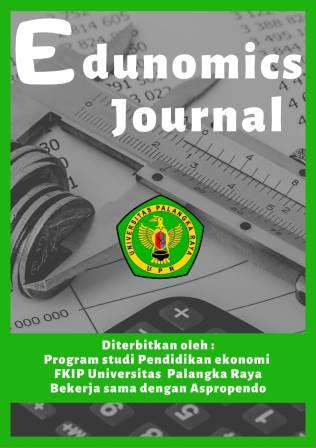Theory of Planned Behavior: Implikasi Teori Dalam Menjelaskan Minat Belajar Mahasiswa Pada Mata Kuliah Akuntansi Keuangan
Keywords:
Theory of Planned Behavior, learning interest, attitude toward behavior, subjective norms, perceived behavioral controlAbstract
The purpose of this research is to explain the implications of the Theory of Planned Behavior in elucidating students' interest in learning financial accounting courses by adopting the framework of the Theory of Planned Behavior, which includes attitude toward behavior, subjective norms, perceived behavioral control, and learning interest. The sample in this study consists of undergraduate students in the economic education program at the University of Palangka Raya who are actively enrolled in the even semester of the 2023/2024 academic year. The data collection method is a survey using a questionnaire as the research instrument. The total sample size is 69. Data is analyzed using Structural Equation Modelling-Partial Least Square (SEM-PLS) with the WarpPLS 8.0 program. The results of the study indicate that the Theory of Planned Behavior is a relevant theory in explaining students' learning interest. The findings show that attitude toward behavior and subjective norms positively influence students' interest in learning financial accounting courses, while perceived behavioral control does not affect students' interest in learning financial accounting courses
Downloads
References
Ajzen, I. (1991). The theory of planned behavior. Organizational Behavior and Human Decision Processes, 50(2), 179–211. https://doi.org/10.1016/0749-5978(91)90020-T
Ariwaseso, G. (2013). Minat Dan Kebiasaan Belajar Terhadap Prestasi Belajar Mata Pelajaran Akuntansi Siswa Kelas Xi Ips Sma Negeri 1 Pataianrowo Nganjuk. Jurnal Pendidikan Akuntansi, 1(1), 1–18.
Atmaja, R., Ramantha, I. W., & Suartana, I. W. (2017). Pengaruh Minat Belajar Pada Pemahaman Akuntansi Dengan Kecerdasan Emosional Dan Kecerdasan Spiritual Sebagai Pemoderasi. E-Jurnal Akuntansi Universitas Udayana, 5(2017), 2021–2046.
Ghozali, I., & Latan, H. (2015). Partial Least Squares: Konsep, Teknik dan Aplikasi SmartPLS 3.0 untuk Penelitian Empiris (2 ed.). Semarang: Badan Penerbit Universitas Diponegoro.
Muliani, R. D., & Arusman. (2022). Faktor - Faktor yang Mempengaruhi Minat Belajar Peserta Didik. Jurnal Riset dan Pengabdian Masyarakat, 2(2), 133–139. https://doi.org/10.22373/jrpm.v2i2.1684
Ningsih, S. A., & Marna, J. E. (2023). Analisis Faktor-Faktor Yang Mempengaruhi Minat Siswa Dalam Pemilihan Program Keahlian Akuntansi di SMKN 2 Padang, 02(1), 108–118.
Putra, K. N., Triyuwono, I., & Purwanti, L. (2018). Analisis Faktor-Faktor Yang Mempengaruhi Niat Melakukan Fraud Pengadaan Barang Dan Jasa Dengan Kesesuaian Kompensasi Sebagai Variabel Moderating (Studi Empiris Pada Pemerintah Kab/Kota Di Kalimantan Selatan. Amwaluna: Jurnal Ekonomi dan Keuangan Syariah, 2(2), 96–119. https://doi.org/10.29313/amwaluna.v2i2.3815
Sembiring, D. M., & Has, Z. (2019). Faktor-Faktor Yang Menyebabkan Kurangnya Minat Siswa Memilih Jurusan Akuntansi Kelas X Di Smk Kansai Pekanbaru. PeKA: Jurnal Pendidikan Ekonomi Akuntansi, 7(1), 27–35. https://doi.org/10.25299/peka.2019.vol7(1).12300
Setiawati, N., Irene, S., Thomas, O., Alexandro, R., & Putra, K. N. (2023). The Effect of Visual Auditory, Kinesthetic Learning Styles on Students’ Learning Interest at Christian Junior High School. Indonesian Journal of Educational Research and Review, 6(2), 466–478. https://doi.org/10.23887/ijerr.v6i2.66319
Sakdiyah et al, Analisis Penerimaan Penggunaan E-Learning dengan Pendekatan Theory of Planned Behavior(TPB) pada Mahasiswa Akuntansi Universitas Jember. e-Journal Ekonomi Bisnis dan Akuntansi, [S.l.], v. 6, n. 2, p. 120-126, may 2019. ISSN 2685-3523.
Utama, F, R., Ardana, Y. (2022). Faktor-Faktor yang Mempengaruhi Minat Mahasiswa untuk Mengikuti Ujian Chartered Accountant dengan Pendekatan TPB.Studi Akuntansi, Keuangan, dan Manajemen,1(2),71-83.









